Sclerostin antibody | AbD09097_h/mIgG2a

Human anti Sclerostin:Preservative Free
- Product Type
- Monoclonal Antibody
- Clone
- AbD09097_h/mIgG2a
- Isotype
- IgG2a
- Specificity
- Sclerostin
| Human anti sclerostin, clone AbD09097_h/mIgG2a recognizes human and mouse sclerostin, also known as SOST. Sclerostin is a secreted extracellular matrix protein that is expressed at low levels in bone, bone marrow and cartilage. It may also be detected in other tissues such as kidney and liver. Sclerostin is important in the negative regulation of bone growth with mutations in the sclerostin gene resulting in conditions associated with high bone mass such as sclerosteosis and van Buchem disease. Sclerostin research may facilitate the development of future treatments for diseases associated with bone loss such as osteoporosis (Papapoulos 2011). Sclerostin mediates its inhibitory effect on bone formation by directly blocking the Wnt signaling pathway. In addition, it has been reported that sclerostin may associate with intracellular bone morphogenic protein 7 (BMP7), and block its secretion in osteocytes (Krause et al. 2010). Clone AbD09097_h/mIgG2a has been demonstrated to block the binding of sclerostin to the Wnt co-receptors, low density lipoprotein receptor-related protein (LRP) 5 and LRP6 on KS483 cells. In a BAT-luc reporter assay, clone AbD09097_h/mIgG2a showed a significant rescue of the inhibition by Sclerostin on the Wnt3a induced BAT-luc activity. Clone AbD09097_h/mIgG2a was also able to rescue the inhibition by sclerostin on Wnt3a-induced AXIN2 mRNA expression and the sclerostin-mediated inhibition of alkaline phosphatase activity induced by Wnt3a (van Dinther et al. 2013). Clone AbD09097_h/mIgG2a is a fully human/mouse chimeric antibody, developed from the inhibitory Fab antibody AbD09097(van Dinther et al. 2013). |
- Target Species
- Human
- Species Cross-Reactivity
-
Target Species Cross Reactivity Mouse - N.B. Antibody reactivity and working conditions may vary between species.
- Product Form
- Chimeric human/mouse IgG2a antibody (kappa light chain) selected from the HuCAL phage display library and expressed in a human cell line. In this chimeric antibody, the VH and VL domains are human sequence, and all the antibody constant domains are from mouse. Anti-mouse Fc specific antibodies are recommended as secondary detection reagents. This antibody is supplied as a liquid.
- Preparation
- Purified IgG prepared by affinity chromatography on Protein A
- Source
- HKB-11
- Buffer Solution
- Phosphate buffered saline
- Preservative Stabilisers
- None present
- Immunogen
- Recombinant human and murine sclerostin.
- Affinity
- The intrinsic monovalent affinity of Human anti sclerostin antibody, clone AbD09097_h/mIgG2a is Kd = 253 nM to human sclerostin and Kd = 49 nM to mouse sclerostinas measured using the ProteOn device (Bio-Rad) on recombinant sclerostin immobilized on an activated ProteOn GLC sensor chip.
- Approx. Protein Concentrations
- Total protein concentration 0.5 mg/ml
- Regulatory
- For research purposes only
- Guarantee
- 12 months from date of despatch
- Acknowledgements
- This product and/or its use is covered by claims of U.S. patents, and/or pending U.S. and non-U.S. patent applications owned by or under license to Bio-Rad Laboratories, Inc. See bio-rad.com/en-us/trademarks for details.
Storage in frost-free freezers is not recommended.
This product should be stored undiluted. Avoid repeated freezing and thawing as this may denature the antibody.
| Application Name | Verified | Min Dilution | Max Dilution |
|---|---|---|---|
| Functional Assays | |||
| Immunohistology - Frozen |
- Technical Advice
- Recommended protocols and further information about HuCAL recombinant antibody technology can be found in the HuCAL Antibodies Technical Manual.
Antibody Characterization Reference
-
Boschert, V. et al. (2015) Crystallization and preliminary X-ray crystallographic analysis of the sclerostin-neutralizing Fab AbD09097.
Acta Crystallogr F Struct Biol Commun. 71 (Pt 4): 388-92.
References for Sclerostin antibody
-
van Dinther, M. et al. (2013) Anti-Sclerostin antibody inhibits internalization of Sclerostin and Sclerostin-mediated antagonism of Wnt/LRP6 signaling.
PLoS One. 8 (4): e62295. -
Boschert, V. et al. (2016) The sclerostin-neutralizing antibody AbD09097 recognizes an epitope adjacent to sclerostin's binding site for the Wnt co-receptor LRP6.
Open Biol. 6 (8) [Epub ahead of print].
Further Reading
-
Krause, C. et al. (2010) Distinct Modes of Inhibition by Sclerostin on Bone Morphogenetic Protein and Wnt Signaling Pathways.
J Biol Chem. 285(53): 41614-26 -
Papapoulos, S.E. (2011) Targeting sclerostin as potential treatment of osteoporosis
Ann Rheum Dis. 70 (1): 119-22 -
Back, J.W. et al. (2012) Selecting highly structure-specific antibodies using structured synthetic mimics of the cystine knot protein sclerostin.
Protein Eng Des Sel. 25 (5): 251-9.
- Synonyms
- SOST
- UniProt
- Q9BQB4
- Q99P68
- Entrez Gene
- Sost
- SOST
- GO Terms
- GO:0005515 protein binding
- GO:0001503 ossification
- GO:0016055 Wnt receptor signaling pathway
- GO:0008201 heparin binding
- GO:0030514 negative regulation of BMP signaling pathway
- GO:0090090 negative regulation of canonical Wnt receptor signaling pathway
- GO:0030279 negative regulation of ossification
- GO:0031333 negative regulation of protein complex assembly
- GO:2000054 negative regulation of Wnt receptor signaling pathway involved in dorsal/ventral axis specification
- View More GO Terms
- Licensed Use
- For in vitro research purposes only, unless otherwise specified in writing by Bio-Rad.
HCA230Z
If you cannot find the batch/lot you are looking for please contact our technical support team for assistance.
Please Note: All Products are "FOR RESEARCH PURPOSES ONLY"
View all Anti-Human ProductsAlways be the first to know.
When we launch new products and resources to help you achieve more in the lab.
Yes, sign me up